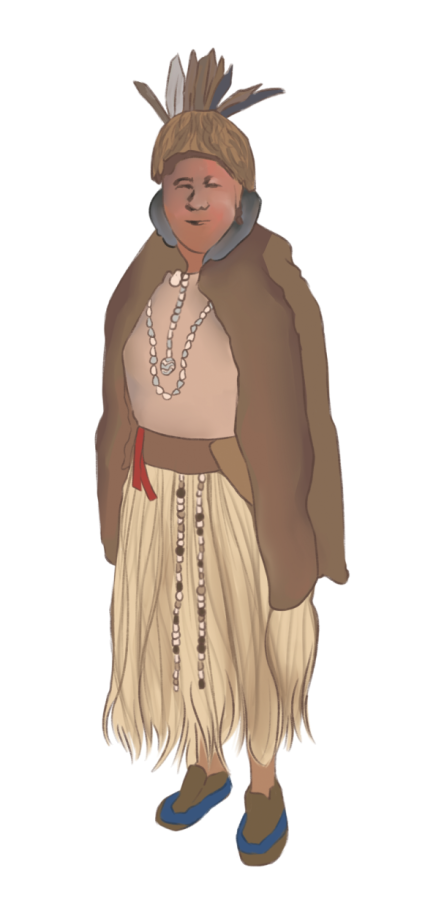
A woman dressed in Muwekma traditional clothing.
The invisible tribe
Local Muwekma Ohlone’s fight for federal recognition
May 24, 2022
Hundreds of years ago, the Ohlone tribe walked the very land that became Palo Alto High School. Traces of tribal history linger in the area, such as in Ohlone Elementary School’s name, or the Palo Alto third-grade curriculum. Nonetheless, the Muwekma Ohlone tribe, which is still in the area with 600 living members, is not yet federally recognized — but new legislation could change that.
The Muwekma tribe, which has resided in the Bay Area for 12,000 years, is fighting to be recognized as a tribe by the federal government. Armed with DNA evidence and records of past censuses, their fight can pave the way for other indigenous tribes. The tribe is urging the passing of the California Senate Joint Resolution 13, introduced March 17, which would establish them as a federally recognized tribe. This would make the tribe eligible for funding and services from the Bureau of Indian Affairs. Recent DNA research serves as one of their primary means of evidence.
According to the tribe’s ethnohistorian (a person who studies indigenous and non-Western cultures) Alan Levanthal, the DNA of current tribe members has been matched with DNA found in burials from over 6,000 years ago in certain parts of the Bay Area.
Levanthal cited the records of the tribe on past censuses and in Native American boarding schools as a reason why the tribe has a case for being recognized. Although the tribe received confirmation that they had once been federally recognized and Congress had never terminated them, Levanthal said, this was not enough to have a lasting effect.
“In 2002, the Bureau said ‘yes, the tribe is a historic tribe, yes the tribe was never terminated and previously recognized,’ but they recommended that Congress put together legislation to re-recognize the tribe,” Levanthal said. “And the problem is that our elected officials within the liberal Democrats or the conservative Republicans, [is that] they will not support tribes.”
The history of disrespectful treatment towards Native American tribes dates back to when European colonizers first arrived. Prior to when the Spanish arrived in America, there were about 1.5 million Native Americans — this number was quickly reduced to fewer than 20,000. As for the Muwekma tribe, there were about 30,000 members prior to European contact. Only 62 people remained.
It’s hard to prove that you are a real tribe if most of the people who were in your tribe have been killed generations ago, and then people were hiding the fact that they were indigenous because you didn’t want to deal with racism around.
— Eric Bloom
The harsh policies towards Native Americans persisted as European settlers moved westward in the 20th century.
“By the 1850s, because of the Spanish and the Mexican and then the United States, the policy wasn’t reservation,” Palo Alto High School history teacher Eric Bloom said. “The policy really was elimination.”
The elimination of tribe members via disease, starvation, and conflict is one reason for the Muwekma’s struggle with becoming recognized, Bloom speculated.
“It’s hard to prove that you are a real tribe if most of the people who were in your tribe have been killed generations ago, and then people were hiding the fact that they were indigenous because you didn’t want to deal with racism around,” Bloom said.
Land has also been wrongfully taken from the Muwekma tribe, according to Levanthal. In 1971, the tribe reached a settlement with the California government in which tribe members received financial compensation for their loss of land.
“The government basically said, ‘We stole the land from you, because you’re Indians, you can’t own land. We will make you rich. Here is $668 as compensation for the theft of the entire state of California,’” Levanthal said.
Despite the rich history between the tribe and the government, there tends to be very little awareness of Native American struggles, including the Muwkema’s current fight.
“Historians have a tendency to write only about the dominant culture, the dominant society, and the Native Americans are only mentioned in passing,” Levanthal said.
The government basically said, ‘We stole the land from you, because you’re Indians, you can’t own land. We will make you rich. Here is $668 as compensation for the theft of the entire state of California,
— Alan Levanthal
Levanthal also said that the tribe’s activism was met with negative reactions from the public.
“They’re very much alive, they were never fully extinct, they were just marginalized and disenfranchised,” he said. “And when they came out with their identification, the fact that they were the aboriginal tribe of the Bay area, they were viewed with contempt and with suspect by various elements of the dominant society. So, how do you convince a society as large as the Bay Area, with all the municipalities, the cities, the counties — how do you educate them when they refuse to be educated?”
Now, with the introduction of the Senate joint resolution and a change.org petition, more attention is being brought to the cause.
“All of the sudden, the mythologies that people have perpetrated and perpetuated are now being shattered by something called the truth,” Levanthal said.
As more people become aware of the Muwekma’s fight, they have the ability to provide hope for other tribes who have faced mistreatment.
“They’re re-evaluating ‘what does it mean to be a tribe?’” Bloom said. “They’ll be able to have that as a template for other California tribes that have had those same struggles.”
Despite the tribe’s extensive evidence, Levanthal said they are continuously treated dismissively, like “refugees within their own homeland.”
“They’re here for 12,000 years, they owned all of California, they were paid pennies for the theft of their land,” Levanthal said. “And they’re still struggling to be reaffirmed as a federally recognized tribe.”
